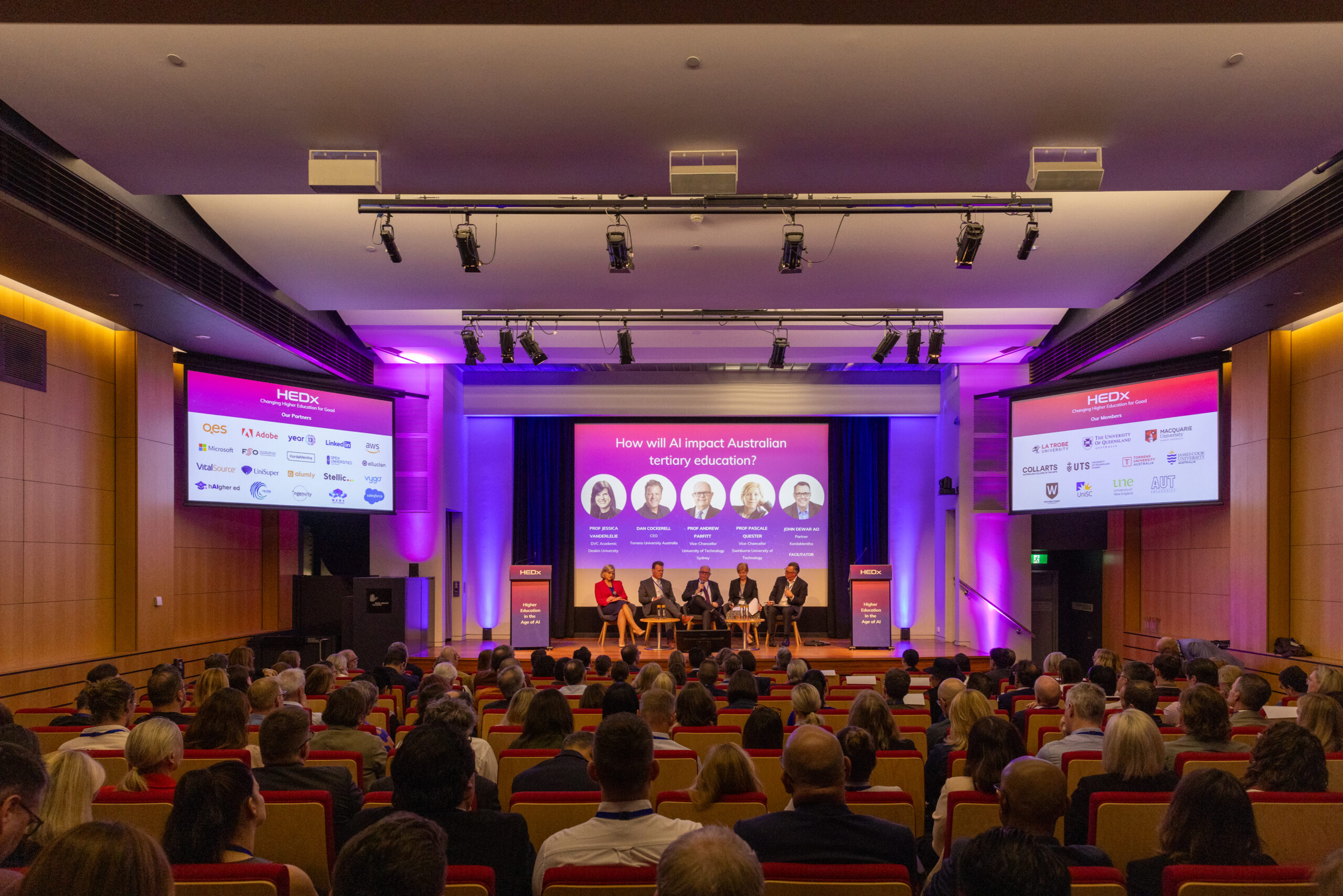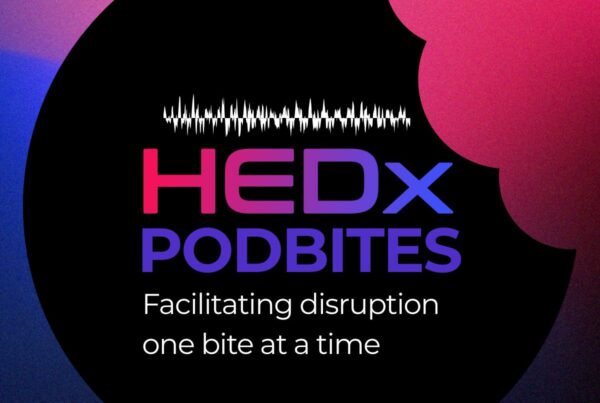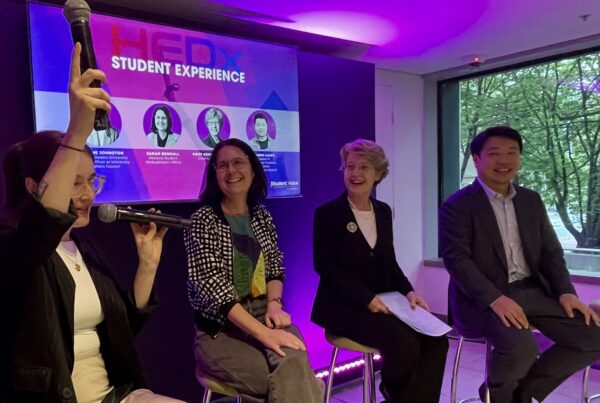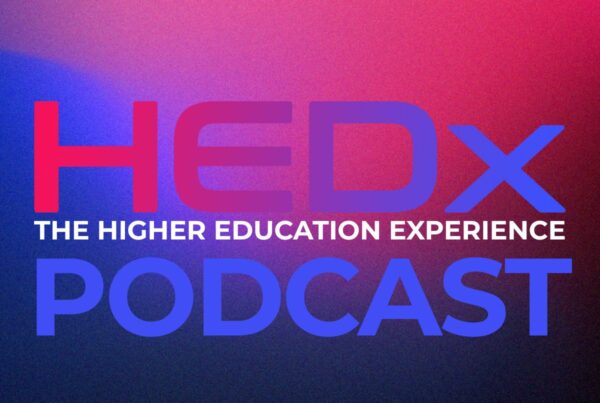The HEDx Action Agenda for the Age of AI
A HEDx newsletter article written by Dr Martin Betts and Professors Marcia Devlin AM, PhD and Kelly Matthews using analysis with AI tools
“If you are not changing as fast as the world around you, you are not changing fast enough.” Melinda Cilento CEO of Committee for Economic Development of Australia
HEDx held its most recent conference at the State Library of Victoria in Melbourne on April 2nd. We designed a day of activities focused on discussions about Higher Education in the Age of AI. Our plan was for collaborative engagement by more than 200 leaders to identify actions needed to progress change needed by individuals, institutions, and the wider sector.
Strategy and bold, human leadership
The event began with event partner and co-host, Professor Theo Farrell Vice-Chancellor of La Trobe University, describing AI as being akin to a new industrial revolution with paradigm shifts in thinking needed to explore unknown paths ahead. He saw acceleration in knowledge, and how it is learnt needing to be attuned to new models, as inevitable by the levels of private investment being made. Our introductions presented a case for human-centred use of the new technology to drive greater equity in access, through partnerships.
We then had a provocation of the concept of an AI-first university, as coined by our opening fireside chat guest, Paul J. LeBlanc on a visit to Australia last year. He has recently released a visionredefining what it means to learn in the age of AI.

His contribution to the conference explored the fundamental challenge and opportunity that AI presents to all in the sector. It is available here as both a podcast and YouTube video of his fireside chat with Theo Farrell and Dr Susan Zhang PhD EMBA of La Trobe. Paul outlined the massive displacement of jobs and people that AI will generate and the need for assistance to our current teachers and educators to navigate change. Resistance to change and the redefinition of what it means to be human are profound challenges—ones that reignite the relevance of the social sciences and humanities.
Paul and his colleagues are launching an AI-first university venture and Theo and La Trobe have committed to pursuing a similar strategy in Australia. This opening fireside chat, and the panel that followed led by John Dewar, AO of KordaMentha, updated and challenged this concept in a wider Australian context in the light of what universities are facing.
It explored how strategies of public and private universities are being revisited in the light of this provocation. Leaders’ views included those from Vice-Chancellors Pascale Quester of Swinburne University of Technology and Andrew Parfitt of University of Technology Sydney. Joining them were Professor Jessica Vanderlelie, recently transitioned as DVC Academic from La Trobe to Deakin University and Dan Cockerell, CEO at Torrens University Australia, bringing new to the sector perspectives on student experience with technology. All are recorded and accessible in this audio podcast session which you can also view in this YouTube session.

“The lecture was invented as an effective way of transporting content at a time when books weren’t affordable. Now access to information is instantly affordable. What are we going to do about it?” – Pascale Quester.
The new paradigm of students using AI to write essays that teachers were using AI to mark, was seen as a significant short-term conflict to be overcome as the technology generates a long-heralded Kodak moment for the sector. Leaders saw disruption as inevitable and for us to avoid it being done to us by the many exploring that opportunity. The chance for current providers to turn into disruptors was a clear message from leaders of how strategies needed to change. The need to deeply understand what students have now become and their needs for flexibility, frictionless experiences, skills and networks in programs of study they can complete, is the challenge to be faced and the opportunity that AI presents.
“I don’t think we should be afraid of being disrupted and I don’t think we should step back from being the disruptor.” – Andrew Parfitt
AI impact on work and skills
The event also focused on the impact of AI on the nature of work and future skills needs. Patrick Kidd of the Future Skills Organisation, discussed with CEO Melinda Cilento, where Australia needs to be in the Progress 2050 conversation kicked off by CEDA. They explored the importance of knowledge and skills to our future workforce, complemented by up to date views from research into AI-impacted skills needs in finance, technology and business from the Future Skills Organisation and analysis by LinkedIn of how the nature of work is changing and how skills first hiring is now more prevalent.
The crisis of current and increasing skills shortages and their exacerbation by future population ageing and decline and technology shifts, were used as ways of arguing and demonstrating that we are changing too little and too slowly.

These challenges were then addressed by sector leaders, partners and other stakeholders including Patrick Kidd OBE OAM of the Future Skills Organisation, Sally Curtain of Bendigo Kangan Institute, Yasminka Nemet of Microsoft, and Megan Lilly using the recent tertiary harmonisation roadmap from Jobs and Skills Australia. They explored the impact on school to work transitions where we have recently co-authored a white paper with Year13. Examples of responses beyond those on the stage include “earn while you learn” pilots including those documented by Alumly.
AI and student success
The critically important area of focus on student success and engagement, and how data and AI can transform that, were our focus with recent HEDx podcast guests in Dr Timothy M. Renick of the National Institute of Student Success, joining Veronica Ng Lam-Pritchard of UQ and George Williams of Western Sydney University. At the conference they shared updates on conversations to bring such an approach more widely to Australia by learning from US experience.

Sue Kokonis of Online Education Services (OES), who with UQ and WSU helped bring Tim to Australia, led a student support through data and AI panel of Will Stubley, Sarah Bendall of the National Student Ombudsman Charlsey Pearce of MortarCAPS Higher Learning Data Standard and Gemma Cadby of Australian Centre for Student Equity and Success (ACSES) Their discussion included how data standards, and better use of data and new AI tools can help address the nature of student complaintsmost recently raised in Australia through the new office of the National Student Ombudsman. Complaints so far are less about AI and more about the processes and bureaucracy that AI can potentially streamline.
The extent to which students are using and relying on both teacher and AI-enabled feedback were in an update from the AIinHE project team. This included great inputs from Margaret Bearman of Deakin University and Michael Henderson of Monash University. Together these sessions provided a strong expression of the student voice on these issues, vital in taking forward an action agenda for AI in HE in partnership with learners.

The overall messages from this part of the event were that we are driving too many of our students away with poor processes and bureaucratic hurdles and that step 1 is to recognise we are the problem, not them. The session also made a clear call for action without waiting for “perfection as the enemy of the good”.
“Don’t make the excuse of waiting for permission or support before you act – do something now.” Timothy M. Renick
Priorities on next stages of AI
The final session saw Lev Gonick share sector leading ambition for AI to support strategy and student success from Arizona State University. He compared approaches with our co-hosts La Trobe in a fireside chat with Manuela Franceschini of Adobe. Lev updated us on how ASU sees opportunity in this technology to review why and how we might use it to remain relevant, through adopting a culture of innovation, in a HEDx podcast just recently. You can watch Lev’s conversation with Manuela and Shainal CIO of La Trobe University in this YouTube recording. The importance of partnerships to ride the pace of change was clear.
Australian public university leaders and innovators followed up with detailed outlines of thinking first aired in HEDx podcast episodes. Phil Laufenberg, Danny Liu and Jason Lodge. They joined co-host Susan Zhang on a panel facilitated by Sam Jacob of Collarts (Australian College of the Arts)to share thoughts on priorities for next stages of AI implementation and how it impacts individuals, institutions and the wider sector.

Susan articulated how being AI-first included being willing to step out of our comfort zone and be vulnerable with students. She coined the phrase to Make Education Cool Again as the MECA we might need to focus on.
Jason M. Lodge challenged us to conceive of the need to focus on creating good learners with AI. His depiction of us needing to think of students working on group work with the smartest person in the world, as AI now featured in every learner’s group, being a good metaphor for the mind shift needed. This might frame the balance between the opportunity and the integrity and learning management challenges we face.
“All students are still doing group work, but their group now includes the smartest person in the world.” Jason Lodge, The University of Queensland
The HEDx AI Action Agenda in the Age of AI
We had invited and challenged all attending to find one idea of what one action they could take in response to the provocations of this event in changing higher education for good. The action agenda below is a compilation of those actions derived from notes and analysis using an analytical LLM-based tool on a transcript of all of the comments made at the event.
Actions for Leadership, Strategy & Culture
1. Stop admiring our challenges and start finding shared solutions as a sector.
2. Encourage universities to disrupt themselves before they are disrupted.
3. Create cross-functional ‘skunkworks’ teams shielded from bureaucracy to rapidly explore AI innovations.
4. Empower staff and leadership with AI tools, skills and time to explore and fail safely.
5. Ensure leadership supports ‘big brain thinking’ by using AI to remove repetitive tasks and free up capacity.
6. Foster institutional cultures of AI experimentation and confidence—rather than policy-first approaches.
Actions in Teaching, Learning & Curriculum
7. Redesign assessment: Don’t just use AI to support essays—replace essays where they no longer serve purpose.
8. Co-create novel learning experiences with students; shifting away from lecture-based delivery.
9. Prioritise the development of students’ complex learning-to-learn skills with AI.
10. Embed AI within discipline-specific curriculum—not generic AI literacy alone.
11. Introduce simulated experiential learning powered by AI to prepare students more effectively.
12. Incorporate reasoning models and ethical understanding into teaching about AI decision-making.
Actions for Student Support & Equity
13. Use real-time data systems to identify and support at-risk students proactively.
14. Schedule mandatory leadership reviews of student success data weekly (as done at Georgia State).
15. Build AI-powered ‘learning agents’ to provide every student with personalised coaching.
16. Provide transparent communication with students about AI tools being used and why.
Actions for the Workforce, Skills & Future Readiness
17. Develop a harmonised tertiary system focused on lifelong learning and skills development.
18. Establish a shared, national definition of ‘skill’ to support aligned education-to-employment pathways.
19. Implement AI-enabled Recognition of Prior Learning (RPL) tools to unlock hidden workforce capacity.
20. Accelerate roll-out of micro-credentials and formally integrate them into tertiary structures.
21. Make employability pathways visible: education providers must show what learners can do, not just what they study.
22. Focus skilling efforts for leaders, teachers and learners on AI and digital literacy at scale, with urgency and agility.
Actions to Safeguard Ethics & Governance
23. Raise institutional ‘ethical literacy’ to ensure appropriate uses of AI—especially for decisions impacting student lives (e.g. admissions).
24. Never allow AI alone to make high-stakes decisions such as in student admissions or hiring.
25. Advocate for legislation and regulation that draws clear ethical boundaries for AI deployment.
Collaboration & Sector-Wide Action
26. Share lessons and failures across institutions to build collective capacity.
27. Dismantle the myth that universities and businesses can’t work together—cultural change is required on both sides.
28. Develop education-business-government forums to co-design skills planning and delivery.
29. Adopt the recommendations from the 2024 parliamentary inquiry into AI and education, including a national AI research centre.
30. Participate in cross-Commonwealth and cross-institutional partnerships (e.g. UK–Australia AI collaborations).
31. Prepare to contribute to the national conversation on AI ethics, AI readiness, and workforce disruption.









